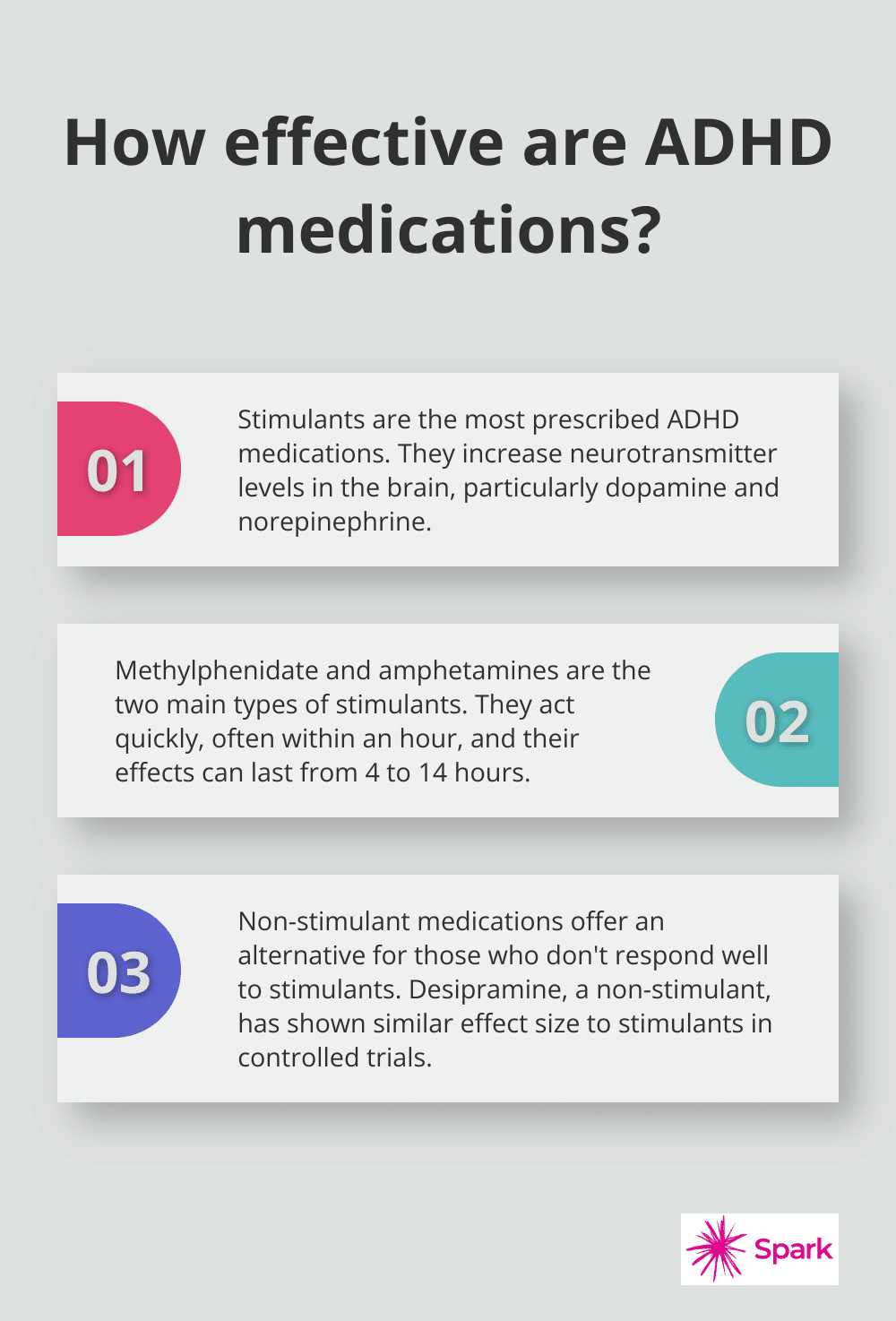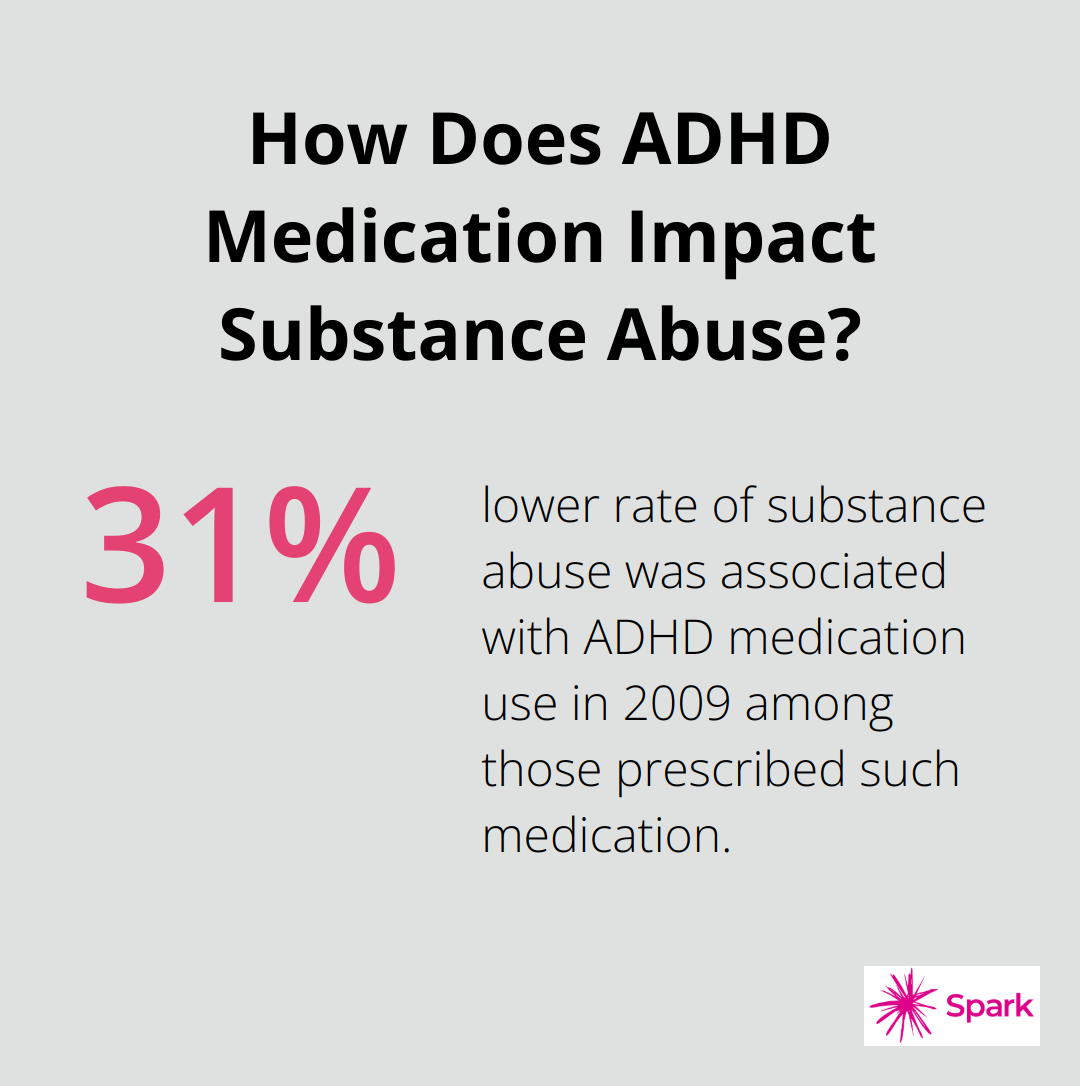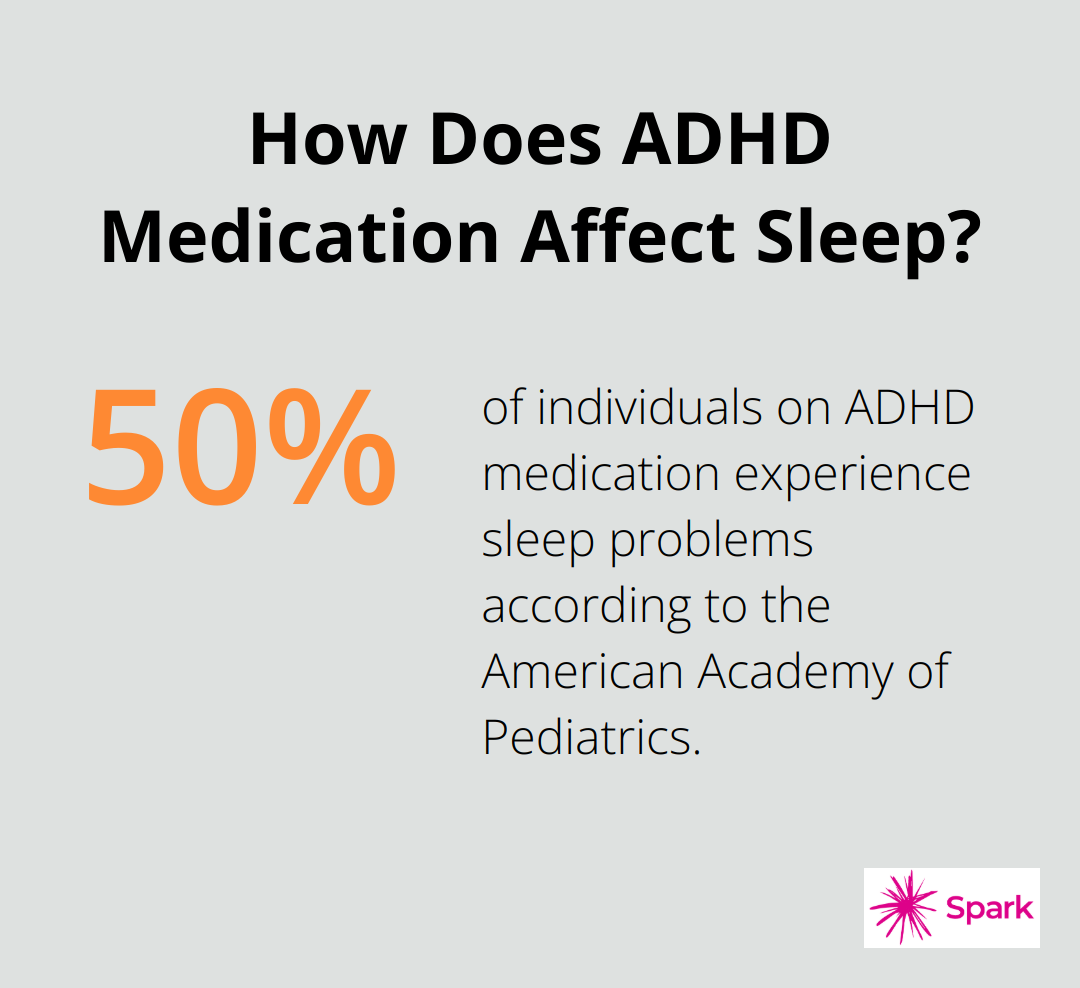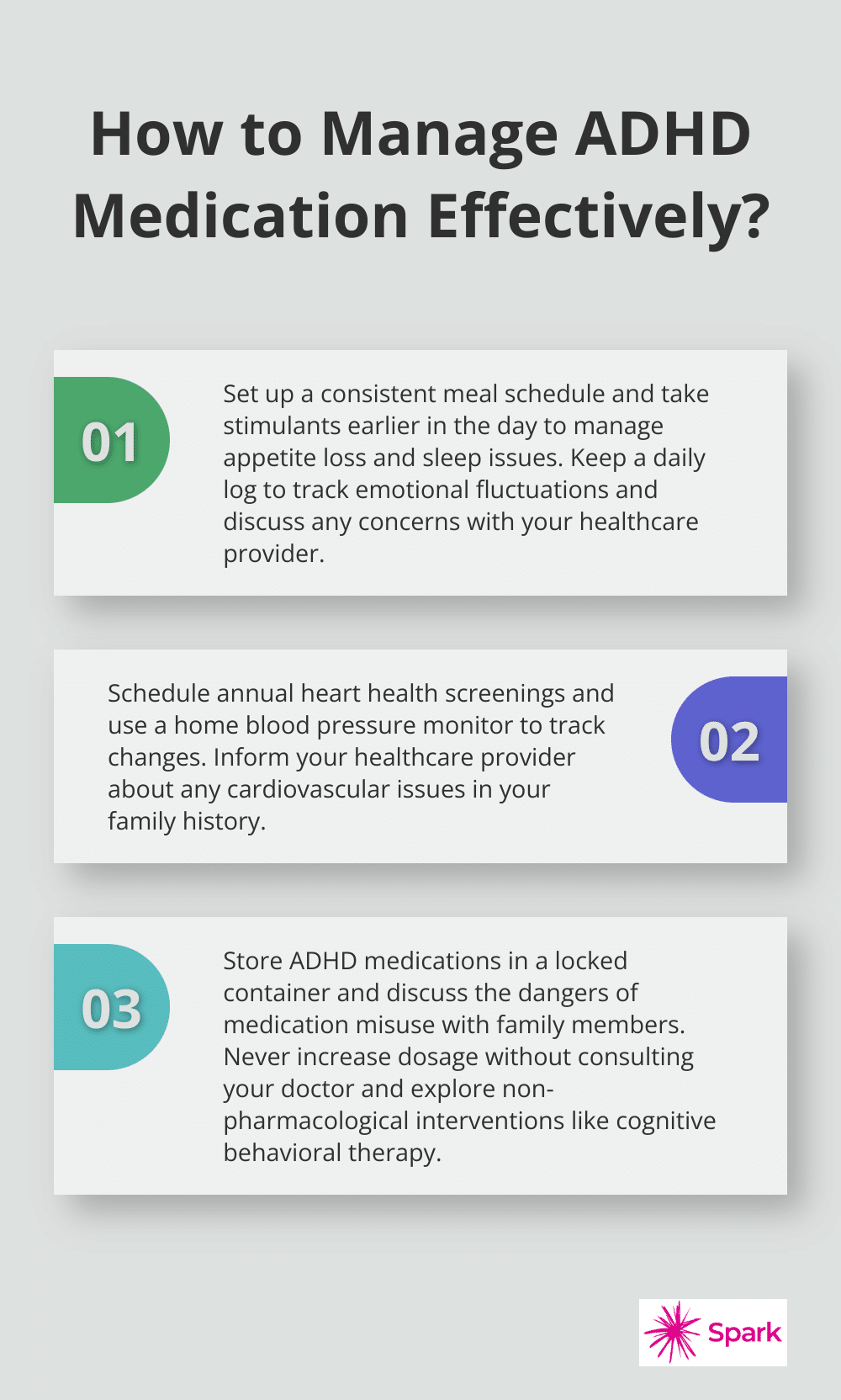ADHD medications can be a game-changer for many individuals struggling with attention and hyperactivity issues. However, they also come with potential risks and side effects.
At Spark Healthcare, we understand the importance of weighing the ADHD meds pros and cons before making treatment decisions. In this post, we’ll explore the benefits and potential drawbacks of common ADHD medications to help you make informed choices about your or your loved one’s care.
ADHD Medication Types and Their Effects
Stimulants: The First-Line Treatment
Stimulants stand as the most prescribed ADHD medications. The efficacy and safety of stimulants for treating pediatric patients with ADHD are based on a large number of studies, primarily focusing on latency-age children. These drugs increase neurotransmitter levels in the brain, particularly dopamine and norepinephrine.

Methylphenidate (Ritalin, Concerta) and amphetamines (Adderall, Vyvanse) represent the two main types of stimulants. They act quickly, often within an hour, and their effects can last from 4 to 14 hours, depending on the formulation.
However, stimulants fall under the classification of controlled substances due to their potential for misuse. Side effects can include decreased appetite, sleep problems, and mood changes.
Non-Stimulants: An Alternative Approach
Non-stimulant medications offer an alternative for those who don’t respond well to stimulants or experience severe side effects. These include atomoxetine (Strattera), guanfacine (Intuniv), and clonidine (Kapvay).
Desipramine, a non-stimulant medication, has been shown to be superior to placebo in a double-blind, placebo-controlled trial. The effect size was found to be similar to stimulants.
Non-stimulants typically require longer to show effects, usually 3-4 weeks, but can work for up to 24 hours. They don’t fall under the controlled substances classification, which means they carry a lower risk of dependency or misuse.
Off-Label Medications: Exploring Other Options
Some healthcare providers prescribe medications off-label for ADHD treatment. Bupropion (Wellbutrin), an antidepressant, and modafinil (Provigil), a wakefulness-promoting agent, serve as examples. While not FDA-approved specifically for ADHD, these medications can prove effective for some patients.
Effectiveness and Individual Variation
The effectiveness of ADHD medications can vary significantly between individuals. This underscores the importance of working closely with a healthcare provider to find the right medication and dosage.
Telepsychiatry services can help patients navigate these options and find the most effective treatment plan for their unique needs. Telehealth has the opportunity to address structural and psychological barriers to treatment by increasing access and reducing caregiver burden.
As we move forward, let’s examine the specific benefits that ADHD medications can offer to individuals struggling with attention and hyperactivity issues.
How ADHD Medications Improve Daily Life
ADHD medications can significantly enhance the quality of life for individuals who struggle with attention and hyperactivity issues. These medications increase dopamine and norepinephrine levels in the brain, which improves focus and reduces hyperactivity.
Enhanced Focus and Productivity
ADHD medications excel at improving focus and concentration. A study found a decrease in inattention in seven out of nine studies that used a single therapeutic approach. This increased focus often translates to better productivity at work or school.
Reduced Impulsivity and Hyperactivity
ADHD medications also help manage impulsivity and hyperactivity. Research indicates that stimulant medications can reduce hyperactive and impulsive behaviors in children with ADHD. This reduction in impulsivity results in fewer interruptions in class, improved decision-making, and better overall behavior.
Improved Social Interactions
The benefits of ADHD medications extend beyond academic and work performance. Many individuals report improved social interactions and relationships after starting medication. This improvement can lead to better friendships, stronger family relationships, and increased self-esteem.
Long-term Benefits
While the immediate effects of ADHD medications are well-documented, long-term benefits are also significant. A study found that ADHD medication was associated with a 31% lower rate of substance abuse in 2009 among those prescribed ADHD medication.

ADHD medications provide significant benefits, but they work best when combined with other treatment strategies such as behavioral therapy and lifestyle changes. Regular follow-ups with healthcare providers ensure the medication continues to be effective and address any potential side effects.
Each individual’s experience with ADHD is unique. Telepsychiatry services offer personalized treatment plans that consider the full spectrum of ADHD management options, including medication when appropriate. The combination of medication with other evidence-based interventions helps patients achieve the best possible outcomes and improve their overall quality of life.
As we explore the benefits of ADHD medications, it’s important to also consider potential side effects and risks. Let’s examine these aspects in the next section to provide a comprehensive understanding of ADHD medication use.
Understanding ADHD Medication Side Effects
Common Side Effects
ADHD medications can cause appetite loss, sleep issues, and mood changes. A study found that some patients experienced a reduction in appetite upon initiating or increasing the dose of stimulant therapy. The American Academy of Pediatrics reports sleep problems affect about 50% of individuals on ADHD medication.

To manage these side effects:
- Take stimulants earlier in the day to reduce sleep issues.
- Implement a consistent meal schedule to counteract appetite suppression.
- Keep a daily log to track emotional fluctuations.
Cardiovascular Considerations
ADHD medications, particularly stimulants, can affect heart rate and blood pressure. A large-scale study in the New England Journal of Medicine found a small increase in cardiovascular events among adults using ADHD medications (though the overall risk remains low for most individuals).
We advise:
- Schedule annual heart health screenings with your doctor.
- Use a home blood pressure monitor to track changes.
- Inform your healthcare provider about any cardiovascular issues in your family.
Growth Effects in Children
Some studies suggest ADHD medications might slightly slow growth in children. A study found that stimulant use over development may be associated with a possible decrease in adult height.
To address this:
- Use growth charts to monitor your child’s development.
- Discuss the possibility of “drug holidays” during school breaks with your doctor.
- Focus on a balanced diet rich in nutrients essential for growth.
Potential for Misuse
Stimulant medications carry a risk of misuse and addiction, especially among adolescents and young adults.
To prevent misuse:
- Store ADHD medications in a locked container.
- Discuss the dangers of medication misuse with family members.
- Never increase dosage without consulting your doctor.
Long-term Considerations
Research on the long-term effects of ADHD medications on brain development continues. Current evidence suggests these medications are generally safe when used as prescribed, but continued monitoring remains important.
We recommend:
- Schedule periodic check-ins with your healthcare provider to assess medication effectiveness and potential long-term effects.
- Stay informed about the latest ADHD medication research through reputable sources (like the National Institute of Mental Health).
- Explore non-pharmacological interventions such as cognitive behavioral therapy to potentially reduce reliance on medication over time.
Final Thoughts
ADHD medications offer significant benefits but also come with potential risks. The decision to use these medications requires careful consideration of ADHD meds pros and cons. A personalized treatment plan, developed in collaboration with healthcare professionals, proves essential for successful ADHD management.

Non-pharmacological interventions complement medication effects and provide additional tools for managing ADHD symptoms. Cognitive-behavioral therapy, lifestyle changes, and educational support can enhance the overall effectiveness of ADHD treatment. Regular communication with healthcare providers ensures that the treatment plan remains effective and safe over time.
Spark Mental Health offers telepsychiatry services for personalized ADHD care plans. Our approach considers both the benefits and potential drawbacks of ADHD medications, prioritizing patient well-being. We encourage individuals to consult with healthcare professionals to make informed decisions about their ADHD management.






